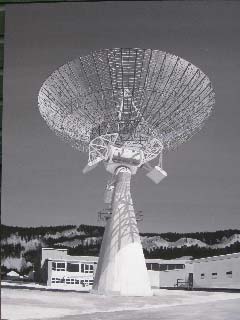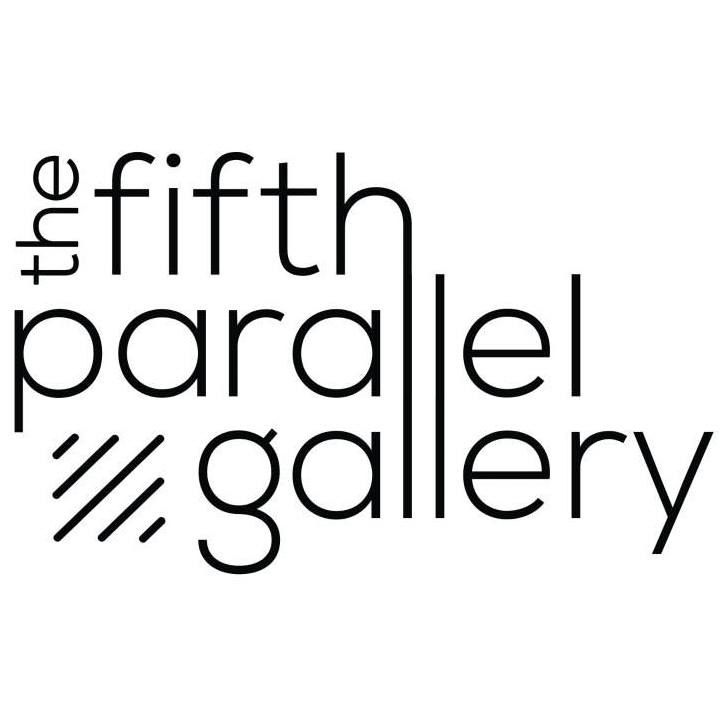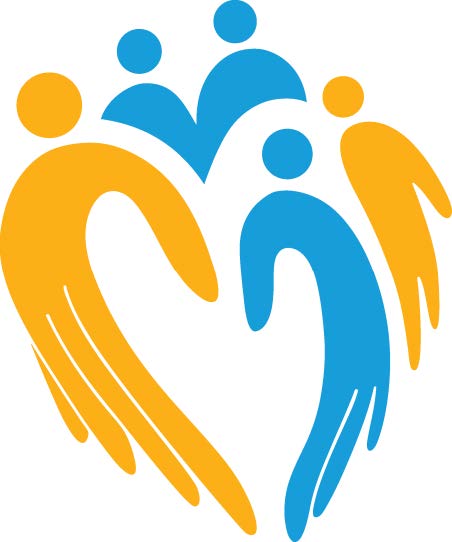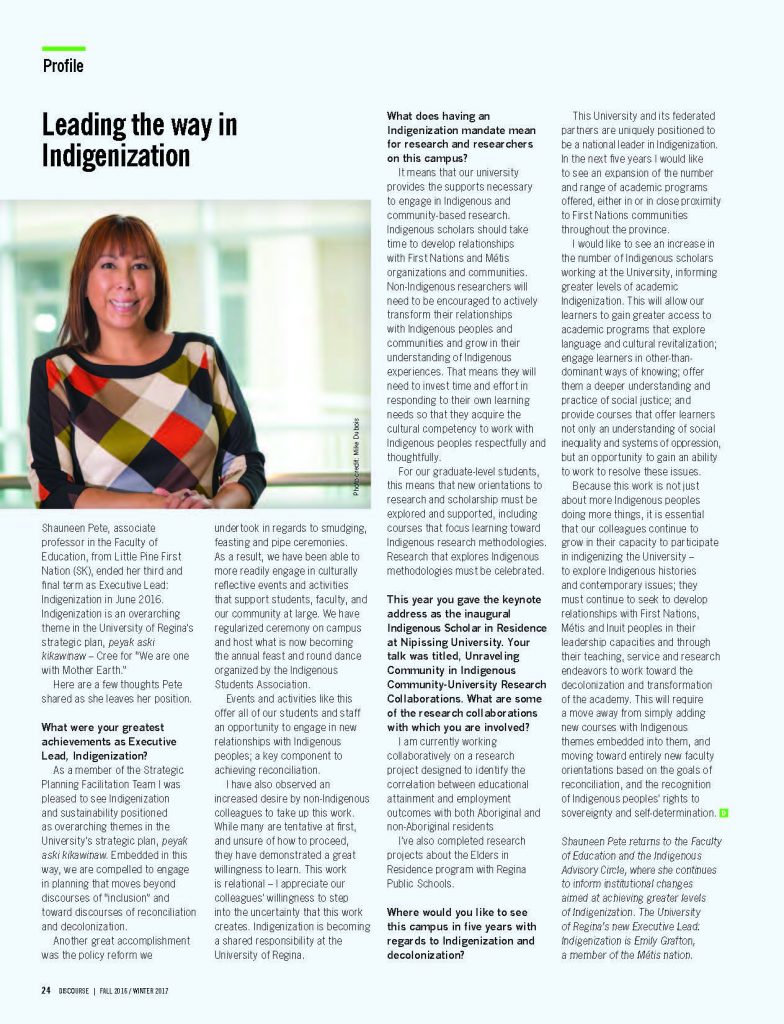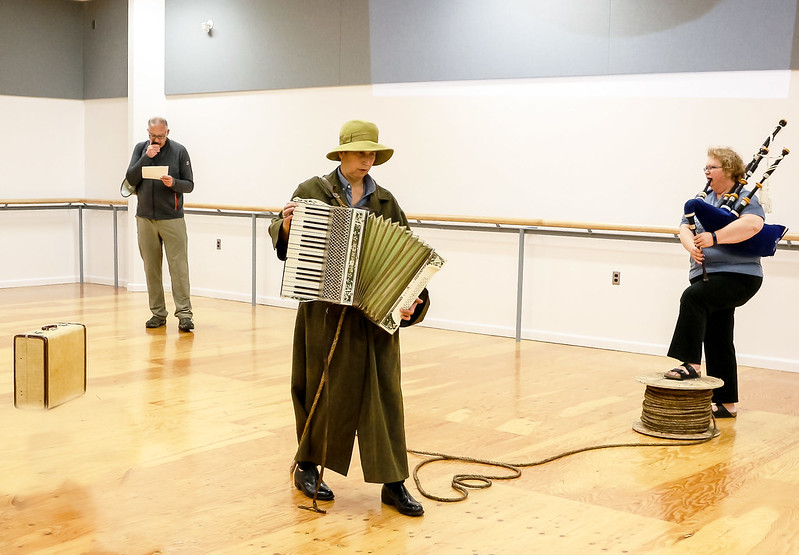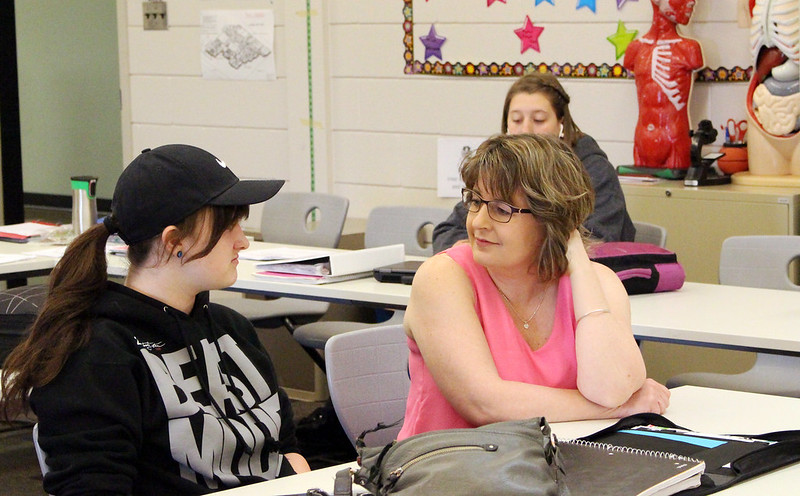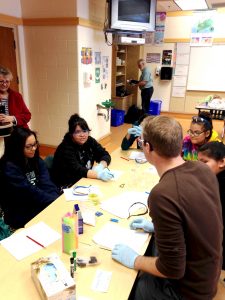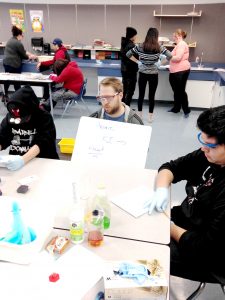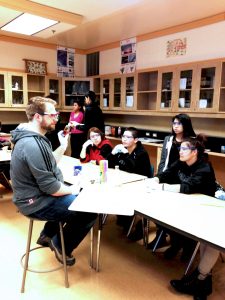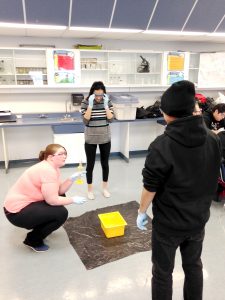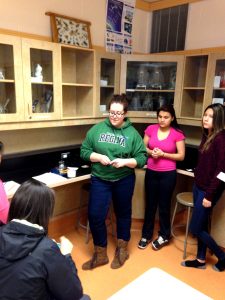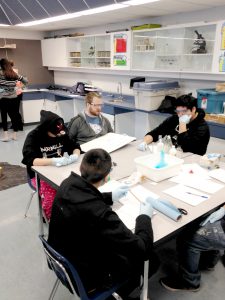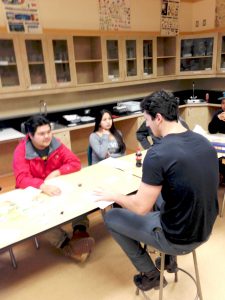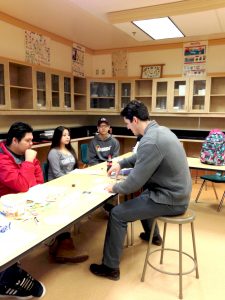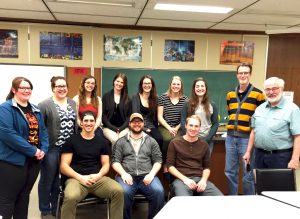Category: Community Engagement
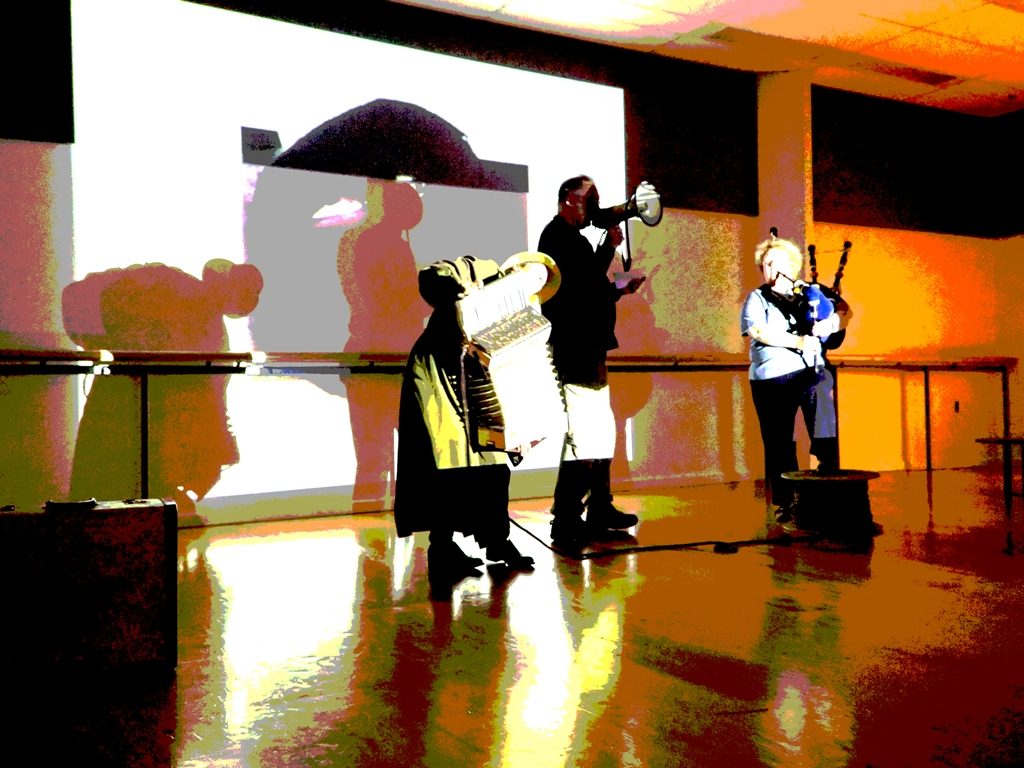
Rehearsing for MAG’s Meet in the Middle Symposium
Dr. Kathryn Ricketts (dance/accordian) and Dr. Gale Russell (bagpipes) with Ian Campbell (media artist) and Ken Wilson (speaker) rehearsing for the “Meet in the Middle | Stations of Migration and Memory Between Art and Film Symposium” that will be held at Mackenzie Art Gallery Nov. 2-5. They will perform Lucky’s Performance Bricolage, an excerpt from Samuel Beckett’s Waiting for Godot, on November 4 at 4:15–4:45 p.m. There will be a workshop after the performance for anyone wanting to participate.
From the Symposium Programme: Kathryn Ricketts will perform a particular rendering of Lucky’s monologue from Samuel Beckett’s Waiting for Godot. This structured improvisation will hinge on fractured text from the play through her unique performative style, folding dance, theatre and voice into a poetic collage of moving images supported by a media artist and bag piper. In the context of the symposium, performer and audience move from Waiting for Godot to notions of liminality and migration and finally to the idea of meeting in the middle from disparate locations.
Research Funding News
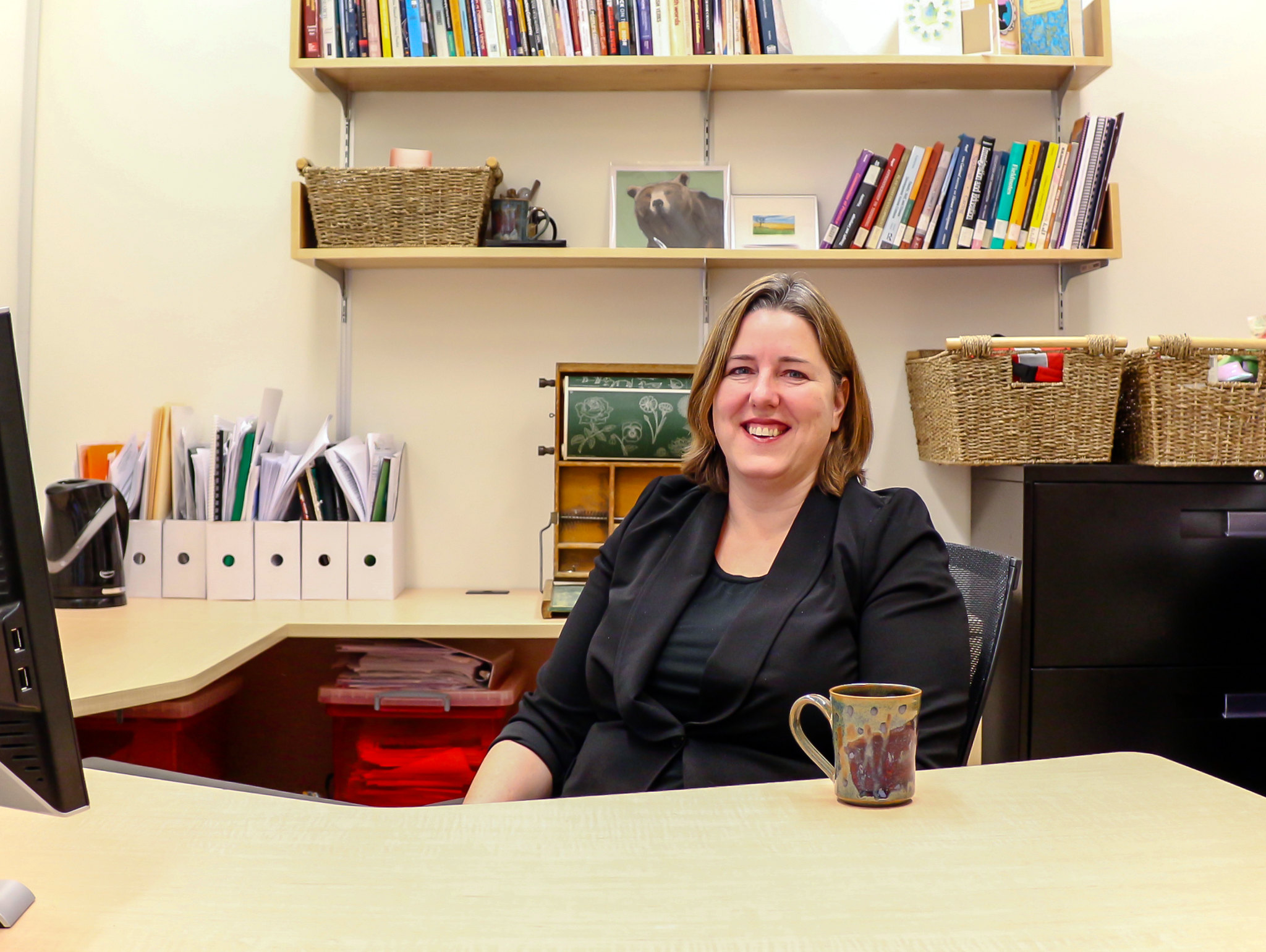
Dr. Christine Massing (Faculty of Education), Dr. Daniel Kikulwe and Dr. Donalda Halabuzu (Faculty of Social Work) and Crystal Geisbrecht (PATHS) have signed a research contract with the Regina Region Local Immigration Partnership in the amount of $19,963.80 for the project “Barriers to Newcomer Adaptation and Settlement.” Needal Ghadi, a doctoral student in the Faculty of Education, will be the research assistant.
The mixed methods study will determine barriers and possible supports that may hinder or aid newcomers in adapting to life in Regina. More specifically, the barriers to accessing child care, education, and employment opportunities will be studied. This is a very timely study in light of the dramatic increase in newcomers to Regina in the last five years. No doubt it will make an important contribution to improving newcomer experiences in many aspects of their lives.
Christine says, “I’m looking forward to being part of this important community service project. We hope to engage with newcomers to Canada and learn about their experiences as they adapt to living here in Regina. Our goal is to gain an understanding of the barriers they have experienced as they try to access child care programs, as well as educational and employment opportunities.”
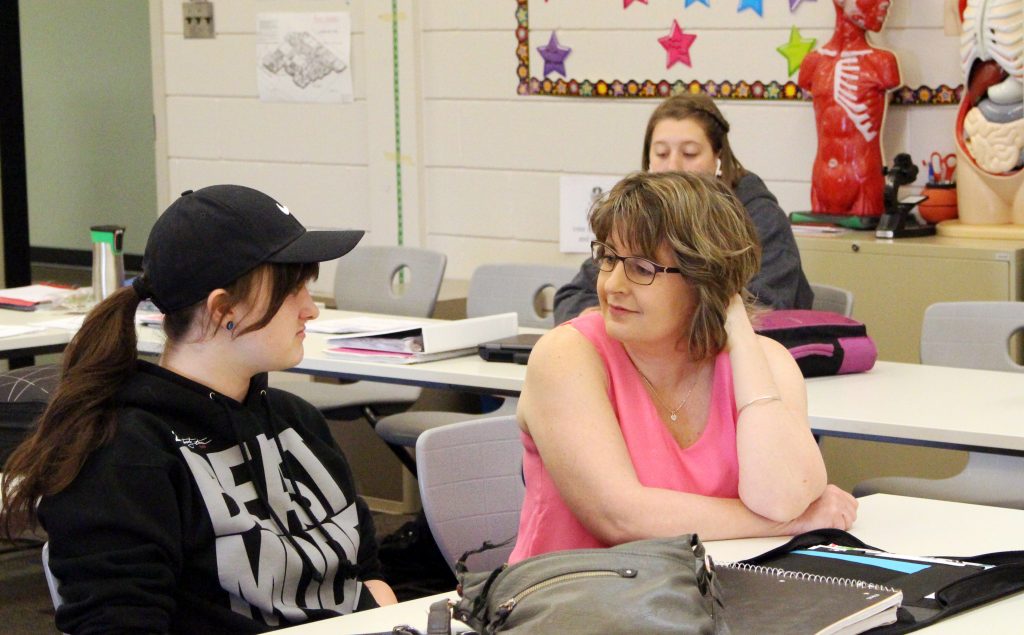
High School Students Take First Year Education Course
For the first time, one of our Faculty of Education courses is being offered with a unique integrated high school course at Campus Regina Public School.
Dr. Twyla Salm is teaching the Education Core Studies (ECS) 100 course at Campus Regina Public as part of their Early Childhood program. Normally, ECS 100 is a required course for first year education students in all programs in the Faculty of Education. At Campus Regina Public, however, the students are still in high school!
In 2012, Regina Public Schools developed Campus Regina Public, an innovative high school program that integrates vocational and technical courses with academic courses for credit. The Faculty of Education and the University of Regina have recently partnered with Regina Public Schools to add another dimension to this already unique high school program. Last winter and, once again, this Fall, ECS 100 is being offered as part of the integrated Early Childhood Program.
Dr. Salm says, “This ECS course is a unique program integrating the learning outcomes of ECS 100, English 20/30, Psychology 30, and Career and Work Exploration 20/30.” Two Regina Public School teachers, Lisa Williams (Career Ed. & Psychology) and Jennifer Minter (English) co-teach with Dr. Salm; they plan, instruct, and evaluate as a team.
Dr. Salm says, “I am very fortunate to work in a collaborative environment with teachers and administrators that are willing to think innovatively about transitioning students from high school to post-secondary. It is a complex pedagogical teaching experience to integrate these courses effectively but our students are learning and many of them are opting to go to university.”
Jennifer Minter, co-teacher with Twyla, says, “We are so very fortunate to be able to offer such an enriching experience for our students. Integrating Dr. Salm’s course into the ECE program that we offer truly raises the bar in terms of the students’ motivation, performance and their overall educational experience. It is a tremendous advantage for them and for us, as their teachers.”
Campus Regina Public students are admitted to the University of Regina through the High School Accelerated Admission Process and receive a university credit when they successfully complete ECS 100. The University of Regina provides a scholarship which covers the cost of tuition so every Campus Regina Public student has the opportunity to experience a university course without the usual expense. Over the past two semesters, the ECS classes have been a diverse group of 32 plus students representing every high school in the city.
In the ECS 100 course, students examine topics such as the history and politics of Canadian school and the purposes it has served; how knowledge has been constructed from various historical contexts, worldviews, and values; and information about literacy and research. Students have a work experience component in which they spend time working in early childhood classrooms. They also gain research skills and learn to think critically and creatively about the construction of knowledge and educational systems.
The following are students’ comments on their experience in this course:
Kayleigh Marsh: I like that this class gives us the opportunity to get a kickstart on our university education and that we’re saving money on the class. We have learned lots about how residential schools affected the children and how they viewed the world.
Selina Musleh: I liked going on my work experience. I learned how to make a lesson plan.
Sydney Vogt: This is definitely my favourite class and it is great to be able to learn more about the development of young kids and get some experience working with them and teaching a few lessons!
Cheyenne Rathje: I love this class. I’m here for two hours a day and I love coming to this class because I get to play with little kids and do fun activities. I would do this class [more] than any other class. This is the best class ever.
Hanna Lapchuk: I have learned in working with younger kids. I have learned how to work with them and understand their learning abilities. I have worked with the kids hands-on and made learning plans with them. Spending 2 hours a day for 2 weeks with them, you really get to know the kids, know how they work, what they like, what they hate, and how to teach them in the best way.
Tabinda and Mishal: Field experience has been amazing! We’ve gained exceptional knowledge. We never knew there was so much in a child at such young ages.
Nicholas Bage: I like how this class gives you real experience on what it is like to teach an early elementary class as well on what to expect in a university class.
Kennedy Weber: I like this class because there is always so much to do and working with the kids is such a learning experience and I love coming here every day.
Chloe Anderson: I love this class because of the hands on experiences we have, along with getting real experience with children of all ages.
Jaida Crichlow:The ECE program has awesome educators and a safe and fun environment to be in.
Brianna Pinay: It is a very great program with many opportunities.
Hailey Harron: I love this program because it teaches you everything you need to become a teacher and how to understand children better.
(Photo gallery below. Slide cursor over photo and click the arrow to see next photos)
UR S.T.A.R.S. and Faculty Involved with Treaty 4 Youth Conference
In April/May 2016, the Regina Public Schools Treaty 4 Project organized a Treaty 4 Youth Conference. Some of our faculty and our UR S.T.A.R.S. students were involved in facilitating the sessions. Dr. Shauneen Pete and Dr. Michael Cappello presented keynote sessions. Dr. Jennifer Tupper presented “A Promise is a Promise” and Russell Fayant (SUNTEP Regina) presented on “The Métis Experience.” The UR S.T.A.R.S. group led the students in the Blanket Exercise. Have a flip through the ebook to read learning reflections and to view artwork by some of the students involved.
Faculty Member to Present on Keynote Panel at Environmental Education Conference
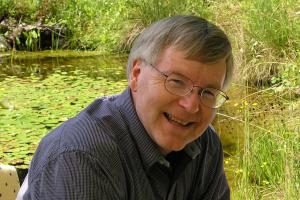 Dr. Paul Hart will be presenting as part of a Keynote Panel for the Research Symposium at the 45th annual North American Association for Environmental Education conference in mid-October. This conference, to be held in Madison, Wisconsin, “will link powerful stories of innovation and success in EE (Environmental Education) from around the world with how environmental education builds community and creates purposeful change.” David Suzuki is listed as one of the Keynote Speakers.
Dr. Paul Hart will be presenting as part of a Keynote Panel for the Research Symposium at the 45th annual North American Association for Environmental Education conference in mid-October. This conference, to be held in Madison, Wisconsin, “will link powerful stories of innovation and success in EE (Environmental Education) from around the world with how environmental education builds community and creates purposeful change.” David Suzuki is listed as one of the Keynote Speakers.
Dr. Hart’s “interactive panel will address the challenges of maintaining and communicating rigor in research from several positions based on panelist’s individual perspectives. Given these diverse questions and perspectives, panelists will create openings for our ongoing discussions of what counts as quality across diverse genres of EE research.”
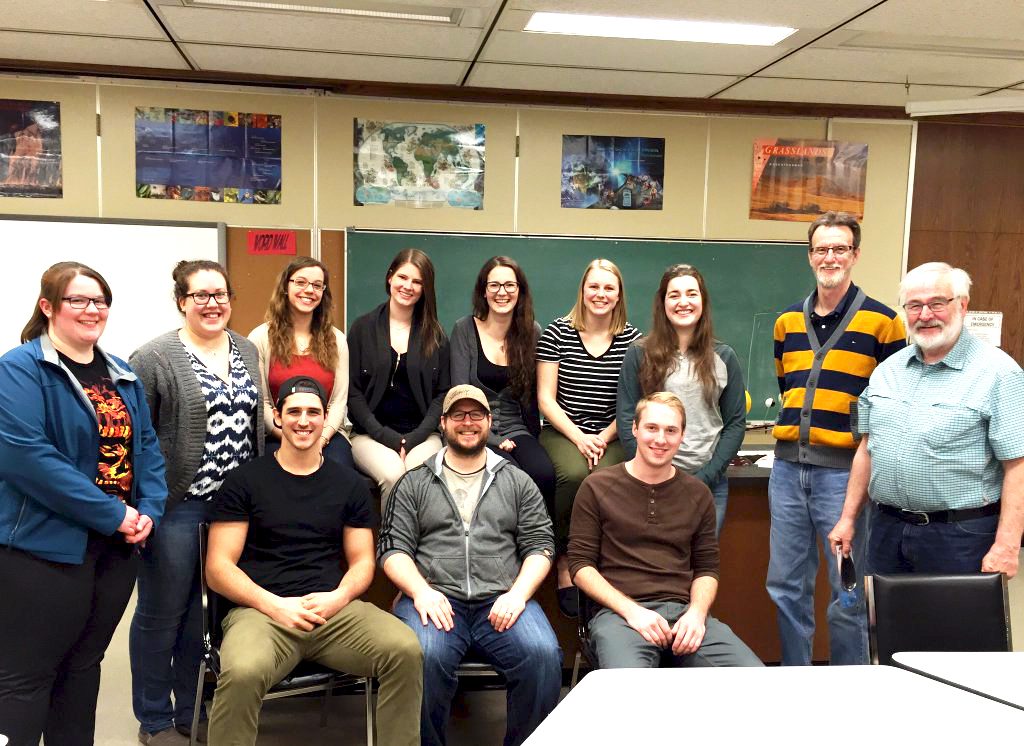
Preservice Science Educators Teach in Yorkton Tribal Council First Nation Schools
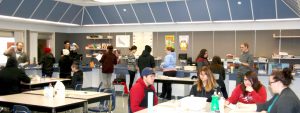 Science Education preservice teachers had the opportunity to take their learning on the road in the winter 2016 semester.
Science Education preservice teachers had the opportunity to take their learning on the road in the winter 2016 semester.
In December 2015, the Yorkton Tribal Council approached the Faculty of Education’s Dr. Shauneen Pete for assistance with science education. Dr. Pete asked Instructors John MacDonald and Michael McCoy, who were teaching secondary science education classes ESCI 350 and ESCI 351, to help out.
With MacDonald’s and McCoy’s support, preservice teachers taking ESCI 350 and 351 planned a two-day session from the Grade 10 curriculum on chemical reactions. Amy Martin explains, “As a class (all 10 of us), we constructed a science unit from scratch, and we actually got to go out and spend two full days teaching science on Kahkewistahaw First Nation and Keeseekoose First Nation reserves.”
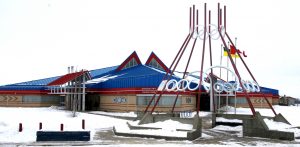 On February 4, the preservice teachers traveled to Chief Kahkewistahaw Community School for the Day 1 activities. Students from Kahkewistahaw, White Bear, Ocean Man, and Ochapowace First Nations participated in the session. The next morning they traveled from Yorkton, where they had stayed the night, to Keeseekoose Chief’s Education Centre. There they had opportunity to work with Grade 10 students from Keeseekoose and Cote First Nations.
On February 4, the preservice teachers traveled to Chief Kahkewistahaw Community School for the Day 1 activities. Students from Kahkewistahaw, White Bear, Ocean Man, and Ochapowace First Nations participated in the session. The next morning they traveled from Yorkton, where they had stayed the night, to Keeseekoose Chief’s Education Centre. There they had opportunity to work with Grade 10 students from Keeseekoose and Cote First Nations.
The following week, they repeated this schedule with Day 2 activities. (However, circumstances prevented them from returning to teach Cote First Nations the Day 2 activities.) The preservice teachers were pleased about this opportunity to work together to develop a series of activities that they also delivered, and the chance to teach at reserve schools, a first for all involved. Instructors John McDonald and Michael McCoy write, “As instructors, we were impressed by the professionalism displayed by our students: the extra work put into developing and organizing the activities, their ability to engage the students in the activities, their ability to reflect on the days activities and incorporate changes for the next day, all served to illustrate the quality of our future professional educators.” The preservice teachers involved were Mari-Anne Berriault, David Brown, Ryan Cherwaty, Shelby Fink, Jenna Hansen, Amy Martin, Laine McLaren, Zach Oleynik, Alyssa Walterson, and Ashley Wiley.
Preservice Teacher Comments:
The experience of teaching at the Kahkewistahaw and Keeseekoose Reserve schools was an eye opening one. The students had only really experienced science through what was taught in their textbooks, so being able to take part in hands on activities was a whole new world for them. It was rewarding to watch them open up throughout the day as they began to get excited about science.
~Alyssa Walterson
Teaching is a profession that is structured on experience. Therefore, as a beginning teacher, this experience was monumental at this point in our teaching career. The ability to experience a diverse culture and environment in a setting that many would not get to experience was a privilege. These short two days allowed me to apply the information being taught in the classroom in a real life setting. One of the most important aspects the experienced offered was the ability to cooperatively plan lessons with fellow students. We grew not only as individuals, but as a cooperative class in order to provide the best experience we could for the students. This to me was the most rewarding experience.
~Ryan Cherwaty
Teaching at the Kahkewistahaw and Keeseekoose Reserves was a great opportunity for us to build some experience working with students who have had very little exposure to science. As a group, we worked hard to design experiments that would engage the students, and spike some interest in a field that they have spent very little time with. For many of the students, this was the first time they were actively participating in hands on science experiments. As the day went on, it was great to see the students excited, engaged, and asking questions. I enjoyed having an opportunity to step out of my comfort zone, and teach in an environment that I have never been exposed to. Experiences like this will only strengthen our platforms as young educators.
~Zach Oleynik
It was a really great experience; my classmates and I were able to gain some experience in co-planning as we created mini lessons for the students. Since there were so many of us, we were able to split the students up into small groups for the lessons, which gave us opportunities to ask the students their thoughts and feelings about being taught science and what they thought about the lessons that we had created.
~Ashley Wiley
Photo Gallery
;
Faculty Member Receives CATE Dissertation Award
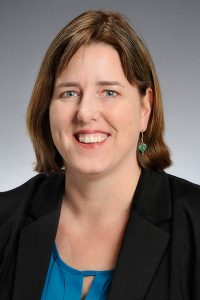
Assistant Professor in Early Childhood Education, Dr. Christine Massing, was recognized by the Canadian Association of Teacher Education (CATE) with the CATE Award for her doctoral dissertation, An Ethnographic Study of Immigrant and Refugee Women’s Knowledge Construction in an Early Childhood Teacher Education Program at the Canadian Society for the Study of Education (CSSE) Congress held in Calgary in May, 2016.
This honor acknowledges Christine’s excellent work and important contribution to Canadian teacher education research.
The following is an interview with Christine about her research, which explored how immigrant and refugee women construct understandings of the authoritative or dominant discourse of early childhood in relation to their own beliefs, values, knowledges, and experiences:
What circumstances/situation led you to research the topic of your dissertation?
At the time I was contemplating doctoral studies, I was teaching in an early childhood program specifically designed for immigrants and refugees. At the end of my first year, one of my students, a refugee from Somalia who had raised 10 university-educated children, expressed to me that she now realized that her approach to mediating her children’s disputes had been “wrong.” Through conversations with my students over the next year, I came to understand that some of the theories and practices they were learning in the program were dissonant with their own understandings. Because I have also lived and taught in diverse contexts—Japan, Egypt, Colombia, Mexico, Guatemala, and in two First Nations communities here in Canada—their comments resonated with me to some extent (although as a temporary visitor I did not experience such discontinuities between worldviews as acutely as my students did). I felt concerned that many of these women—all of whom had extensive experience as mothers, teachers, or caregivers in their home countries—might believe that they needed to abandon all that they knew about teaching and caring for young children to be accepted in Canadian school and preschool settings. Despite their candor, I sensed that they were reticent to be too critical of the program and, by extension, me as an instructor so I felt I might elicit more details as a researcher.
How has your research impacted your personal and/or professional life?
On a personal level, I have appreciated the friendships I have developed with many of my research participants and I have learned so much from them. Professionally, this research has assisted me in identifying some of the funds of knowledge that immigrants and refugees bring to early childhood theory and practice, which, in turn, enriches my own work with teacher candidates. I hope to mobilize these new understandings to guide teacher candidates toward being more responsive to culturally and linguistically diverse children and their families. This research has also deepened my understanding of how teacher candidates navigate unfamiliar content in their coursework and internships and inflect their practice with their own beliefs and values. If students have time and space for dialogue with the content and practices they are learning, they can populate their practice with their own intentions and meanings and make it their own.
What do you hope your research might accomplish in the field of education?
When I undertook this research, I had the impression that my immigrant and refugee students simply appropriated the dominant practices because they wanted to “fit in” and be seen as professionals. However, I was surprised to find that in some situations the participants rebelled against the authoritative practices, instead enacting their own beliefs and practices when their supervisors were not looking. Therefore, they risked failing their placements because they strongly believed that some of the dominant practices were not in the best interests of the children. It is my hope that early childhood sites and teacher education programs will begin to acknowledge the validity of what Bakhtin refers to as “multiple, polyphonic voices” so culturally and linguistically diverse teacher candidates can imbue their practice with their own knowledges and beliefs. I believe that such practices will provide richer and more meaningful experiences for immigrant and refugee children and their families who will be supported in their diverse ways of being and becoming.
Was it difficult to achieve your research goals? How did you overcome obstacles (if any), whether personal or professional?
The primary concern I had in doing this research was gaining the trust of participants because I was researching in a program for immigrant and refugee early childhood students and was very obviously an outsider. Although the participants knew that I was a doctoral student and early childhood instructor, for three semesters, I sat in classes alongside them and participated in all of the course experiences as a student in the program. Many of my participants were Muslim so the fact that I had lived and worked in Egypt was particularly helpful in building trust. They did come to accept me as “one of them” so much so that they invited me to participate in their activities and transgressions (such as skipping class!).
An Excerpt
The following excerpt from Christine’s dissertation illustrates the tensions faced by immigrant/refugee early childhood students, something she considers to be at the heart of her research:
Ameena’s explanation actualizes this tension between personal or cultural ways of being with children and the authoritative discourse of professionalism: “Professional means you do how they teach you [in the ECTE program] even if they (supervisor or instructors) don’t see you…. Joanne [an educator], she’s more professional in how she talks to the kids, how the kids love her. Everything she does in a real way, the right way, and a real way” (Interview, February 28, 2013). Joanne is perceived as holding the “right” professional knowledge, but she is also “real,” acting intuitively and applying what she personally knows about children. Consistent with Wenger’s (2000) work, the professional educator must be able to mobilize her personal understandings and refine the expected competencies. Since the practical knowledges of immigrant and refugee students or educators are excluded from the authoritative discourse, it is difficult for them to legitimately apply their own understandings in this manner. Essentially, these women are positioned as needing to change themselves otherwise their learning trajectory will never lead to full, legitimate participation in the early childhood community of practice (Wenger, 1998).
Abstract: In my former role as an early childhood education instructor working with immigrant and refugee women, I came to understand that they might experience a dissonance between the authoritative discourse (Bahktin, 1981) of early childhood, inscribed with western theories and values, taught in the program and their own intuitive, tacit, and practical knowledges. The purpose of this study, funded by the Social Sciences and Humanities Research Council of Canada and the Killam Trusts, was to explore how twenty immigrant/refugee women constructed understandings of this authoritative discourse as they negotiated their professional identities during their coursework and field placements in an early childhood teacher education program. Using an ethnographic methodology, I was immersed in the participants’ coursework and practicum experiences for two to three days a week over three semesters of study, collecting qualitative data through field notes, spatial mapping, interviews, focus groups, and artifacts/documents. One of the most significant findings of this research pertained to the participants’ own responses when confronted by discontinuities between the professional expectations in the field and their own knowledges, practices, beliefs, and values. Consistent with the limited scholarship in this field, the participants did sometimes feel compelled to suppress their own beliefs and enact what they had learned in the program in order to be seen as professionals. However, this research elucidated two additional responses. First, the participants sometimes resisted or rejected the authoritative discourse in favour of their own cultural practices. On other occasions, they authored their own hybridized professional identities derived both from the professional expectations in the community of practice as well as from their own cultural and religious beliefs and values about how to teach and care for young children. This research contributes to our understanding of the knowledges and experiences immigrant and refugee women bring to the field which can be mobilized to support the meaningful inclusion of immigrant/refugee children and their families in schools or early childhood settings.
Supervisor: Dr. Anna Kirova, professor of early childhood education at the University of Alberta,
Committee members: Dr. Heather Blair and Dr. Lynne Wiltse.
Date defended: October 26
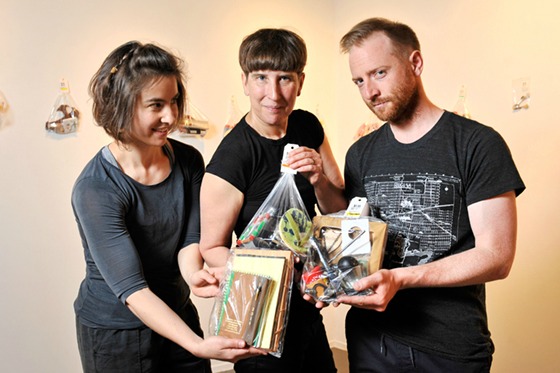
Performance Exhibit Brings Discarded Items to Life ~Q&A
For a long time, Kathryn Ricketts, assistant professor of Arts Education, has enjoyed the wall of Value Village, where clear plastic bags hang and are filled with discarded household items.
The bags usually sell for $2.99. They represent a good deal for some shoppers, but for others, they’re just a collection of useless items.
For Ricketts, it’s inspiration for an exhibition, a series of workshops and performances.
The Anthropology of the Discard is now on display at Fifth Parallel Gallery at the U of R. The public is invited to a performance May 12 at 7:30 p.m. with a closing reception to follow.
We spoke with Kathryn and asked her what she saw at Value Village that inspired her to come up with this idea.

I live close to Value Village and found myself visiting the wall of bags frequently. I was compelled by the combination of objects and how they seemed to have their own logic in connection to each other. It made me think about the person who decided which objects should be together and thought of him/her as both an Anthropologist and Curator.
I hope to ask Value Village to be an artist in residence for a period so I could work alongside that person in order to understand their choices and maybe I can make some bags as well.
Incidentally there is a wall at the exhibition where bags made by the visitors hang. Value Village has donated a box of objects and we invite anyone who visits the exhibition to be part of it by contributing their own custom made bag!
You say these bags are bulging with compelling possible new narratives. What are some of those narratives?
These are stories that are triggered by seeing the objects. They can be from our own personal memories or mere associations. We all have either in possession and or memory so many objects in our lives that are near and dear to us and have so many stories attached. I buy the bags that contain objects that seem to be attached to some of these stories.
The performance is improvisation. You are joined by local performers Johanna Bundon and Jaydon Pfeifer.
What will people see at the show?

We will start by asking the audience to choose three bags from the wall and then Jayden, Johanna and I will choose the one that seems the most potent with ‘stories waiting to be told’. We will then begin to work with one of the objects to familiarize ourselves with a story and then begin to delve into the others. All of our movement and text is entirely improvised however we are very carefully weaving our stories within an emergent history of stories that are being told by each other. As a result, characters, locations, time periods and situations begin to emerge. At times we record some of this information behind us on large banners of paper which serve as a kind of blue print of the emerging story as a whole. I harken it to standing across the street from an apartment building and watching all of the stories unfold in each of the apartments that seem to tell the story of that entire building.
What are you hoping to take away from this for your teaching?
I believe that stories have a very important place in our community and classrooms. It is through stories that we come to understand our curriculum of the world and how our education curriculum embeds itself within this. Stories are so naturally triggered from artifacts of meaning and have had a place in the classroom for a long time, i.e when we think about Show and Tell. When we work from a conglomerate of objects opposed to just one, we begin to understand how our stories interconnect with others and how this reminds us of our connected humanity.
Event: Anthropology of the Discard
Date: May 12
Time: 7:30 p.m.
Location: Fifth Parallel Gallery – Riddell Centre
A closing reception follows the performance.
By Costa Maragos Posted: May 11, 2016 U of R Feature Stories
Anthropology of the Discard: An Interactive Exhibition
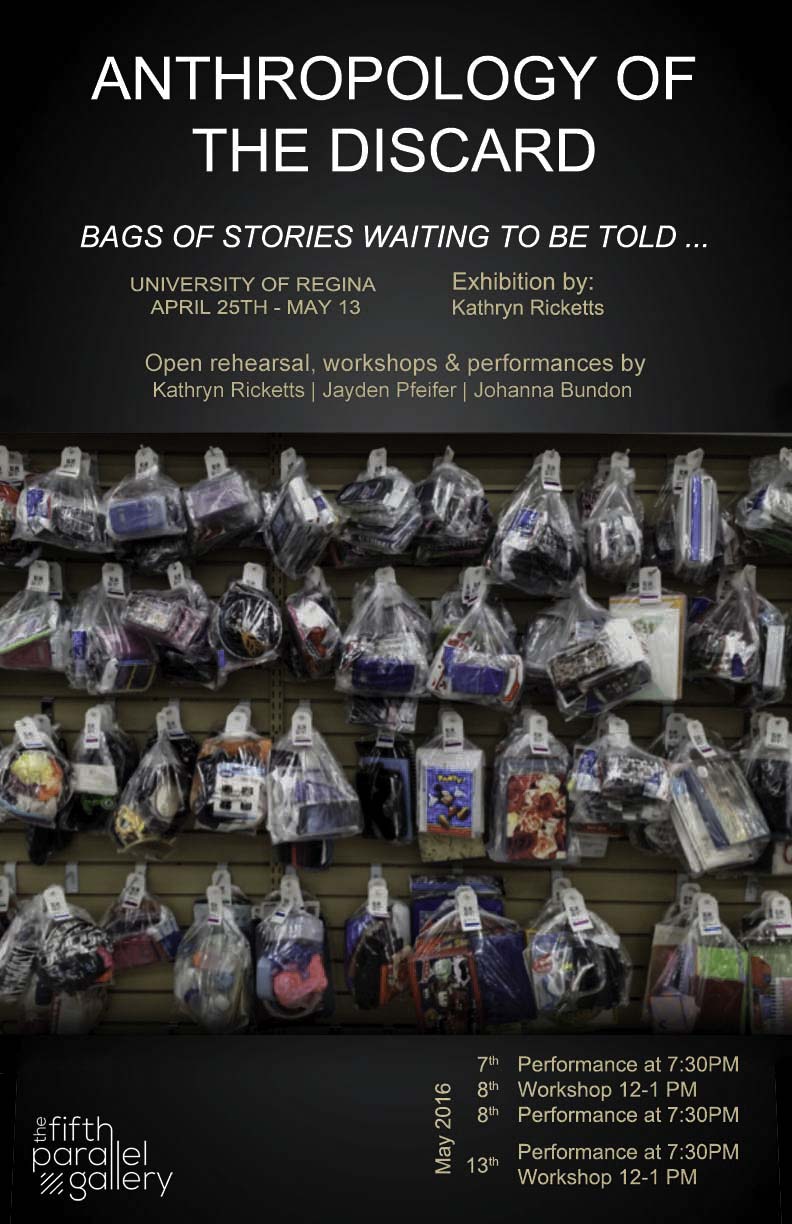 “Anthropology of the Discard” is an interactive exhibition illuminating the saliency of objects as triggers for performative storytelling. It is also a display of artifacts as emblems of lives lived, and lives that refuse to be seen in isolation of each other. Fascinated by the wall of Value Village where conglomerates of objects hang in plastic bags for the standard price of $2.99, Dr. Kathryn Ricketts has collected those that are ‘bulging’ with compelling possible new narratives.
“Anthropology of the Discard” is an interactive exhibition illuminating the saliency of objects as triggers for performative storytelling. It is also a display of artifacts as emblems of lives lived, and lives that refuse to be seen in isolation of each other. Fascinated by the wall of Value Village where conglomerates of objects hang in plastic bags for the standard price of $2.99, Dr. Kathryn Ricketts has collected those that are ‘bulging’ with compelling possible new narratives.
Grad student Jayden Pfeifer and dancer Johanna Bundon have been experimenting along with Kathryn Ricketts for several months around these concepts. Join them in a performative exhibition in April/May at The Fifth Parallel, (U of R, Riddell Centre) where they are excited to share their deepened understanding of the power of objects.
The audience is invited to construct their own bulging bag of stories (ongoing). Bags and objects will be available in the gallery or participants can bring their own constructed bag of objects from home.
Watch an open rehearsal to see how the performed stories are constructed (Posted at Gallery). Watch a 30 min performance of a bulging bag of evocative objects (May 7, 8 & 12th, 7:30 PM). Take in a workshop to learn how to create performative narratives from discarded objects. (May 7 & 8th 12 – 1 PM)
